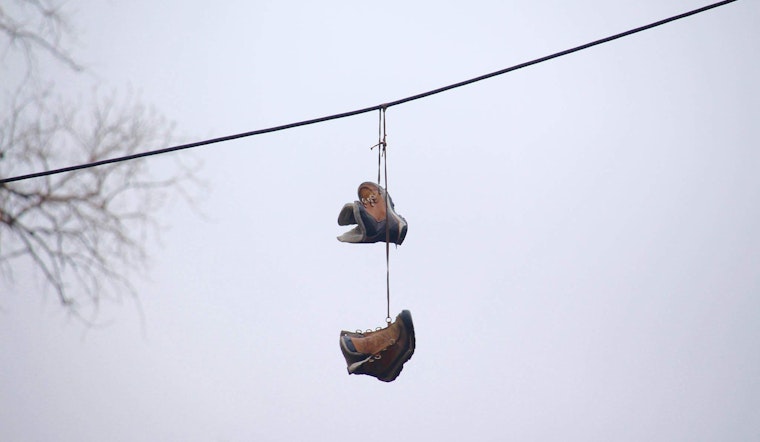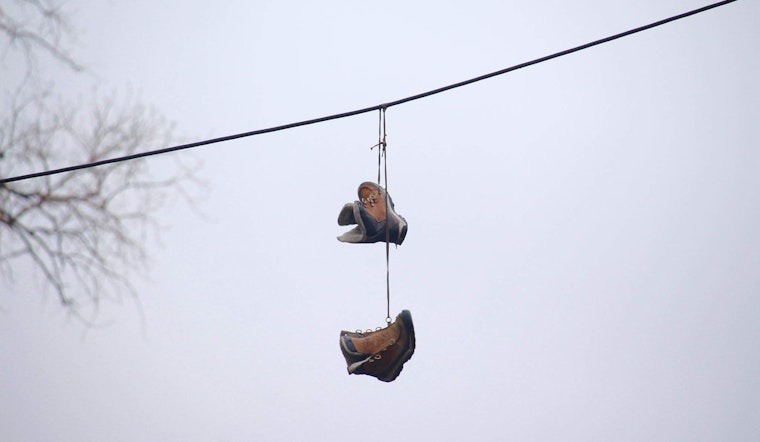HT6. Ever Seen Shoes on Power Lines? Here’s What It Really Means
If you’ve ever walked through a city, town, or suburban neighborhood, chances are you’ve come across an unusual sight: sneakers, boots, or other types of shoes hanging from power lines or telephone wires. These suspended shoes can be found in major cities like New York, Los Angeles, and Chicago, as well as in small rural towns around the world. But what exactly do these dangling shoes mean?
The truth is, there is no single answer. Over the years, various theories have emerged about why people throw their shoes onto power lines. Some explanations are linked to urban legends, while others stem from real-life traditions, cultural practices, or even criminal activity. In this article, we’ll explore the most common theories behind this curious phenomenon.
1. A Mark for Drug-Related Activity or Gang Territory

One of the most widely believed theories is that shoes on power lines signify a location for drug deals or gang territory. This idea has gained traction in cities where gang-related activity is prevalent, such as Los Angeles and Chicago. According to urban legend, the presence of shoes hanging over power lines can indicate a nearby crack house, a common location where drugs are sold.
Los Angeles has taken this issue seriously. In 2003, Mayor James Hahn led a campaign to remove shoes from power lines after concerns arose that they marked gang turf or drug-selling zones. The removal was part of a broader effort to reduce crime and improve the city’s image. However, despite these efforts, there is no concrete evidence to prove that all instances of shoes hanging from power lines are linked to criminal activity.
Chicago has also struggled with a high number of complaints about shoes on power lines. In 2008 and 2009, the city received approximately 1,000 requests per year to remove dangling shoes. However, by 2015, that number had significantly declined to just over 100 reports annually. While some believe this decrease correlates with reduced gang activity, city officials have never confirmed a direct connection between the shoes and crime.
2. Memorials for Deceased Loved Ones

In some communities, shoes on power lines serve as memorials for deceased individuals. Friends and family members may throw shoes over wires to honor a lost loved one, especially if that person died tragically or at a young age. This practice is often seen in urban neighborhoods, where informal memorials are a common way to pay tribute to those who have passed away.
In some cases, gang members use this tradition to commemorate fallen comrades. When a gang member is killed, associates may hang their shoes over power lines near the site of the incident as a way to remember them. This practice is similar to creating murals or street memorials with candles and flowers.
While this tradition is heartfelt for some, it can also be controversial. In certain cities, authorities remove hanging shoes from power lines to prevent the area from becoming associated with violence or criminal activity.
3. Celebrating Life Milestones

Not all shoes on power lines have negative connotations. In some cases, the act of tossing shoes over wires is a way to celebrate important life milestones.
Graduation Rituals
For many high school and college graduates, throwing shoes onto power lines is a rite of passage. This tradition is similar to tossing a graduation cap into the air after receiving a diploma. By leaving their shoes behind, students symbolically say goodbye to their school years and move forward into adulthood.
Some believe this practice originated in military culture, where service members would toss their boots onto power lines after completing basic training. In some cases, soldiers even paint their boots in bright colors before throwing them as a mark of celebration.
Loss of Virginity
Another lesser-known explanation suggests that young men sometimes throw their shoes over power lines to signify the loss of their virginity. While this theory is more anecdotal than widely accepted, it adds another dimension to the mystery of hanging shoes.
4. Pranks, Bullying, and Acts of Mischief

Not every pair of shoes on a power line carries deep meaning. In many cases, it is simply the result of a prank or an act of mischief. Teenagers, in particular, have been known to throw their old sneakers over power lines for fun or as a challenge among friends.
Unfortunately, not all cases of shoe tossing are harmless. Some instances are linked to bullying, where victims’ shoes are stolen and thrown over wires, leaving them stranded and humiliated. This type of behavior can be especially problematic in schools and low-income neighborhoods, where replacing lost shoes may be difficult for some families.
Additionally, alcohol consumption can play a role in shoe tossing. Drunken individuals may find it amusing to remove their shoes and hurl them over power lines, only to regret it the next day when they have to walk home barefoot.
5. Superstition and Folklore

In some cultures, people believe that throwing shoes onto power lines can bring good luck or ward off evil spirits. While not as commonly cited as the other explanations, this belief ties into a broader tradition of using objects to create protective barriers against bad luck.
A variation of this superstition involves newlyweds tossing their shoes over power lines to ensure a happy and long-lasting marriage. While this practice is rare, it highlights how different cultures assign symbolic meaning to everyday objects.
6. Artistic and Social Commentary

Some individuals view shoes on power lines as a form of street art or social commentary. In urban environments where graffiti and public art installations are common, hanging shoes can serve as an expression of creativity or protest.
For example, some artists have intentionally placed shoes on power lines to draw attention to social issues such as homelessness, inequality, or gang violence. By making these shoes highly visible, they aim to spark conversation and raise awareness about important topics.
Conclusion
The sight of shoes hanging from power lines is a global phenomenon with no single explanation. While some instances may be linked to gang activity or drug dealing, others serve as heartfelt memorials, graduation celebrations, or simple acts of mischief. Additionally, cultural beliefs and artistic expression add even more layers to this intriguing tradition.
Whether you view hanging shoes as an urban mystery, a playful prank, or a symbol of something deeper, one thing is certain: they capture our curiosity and make us wonder about the stories behind them. The next time you see a pair of sneakers dangling from a power line, you might just find yourself contemplating the many possible reasons they ended up there.













